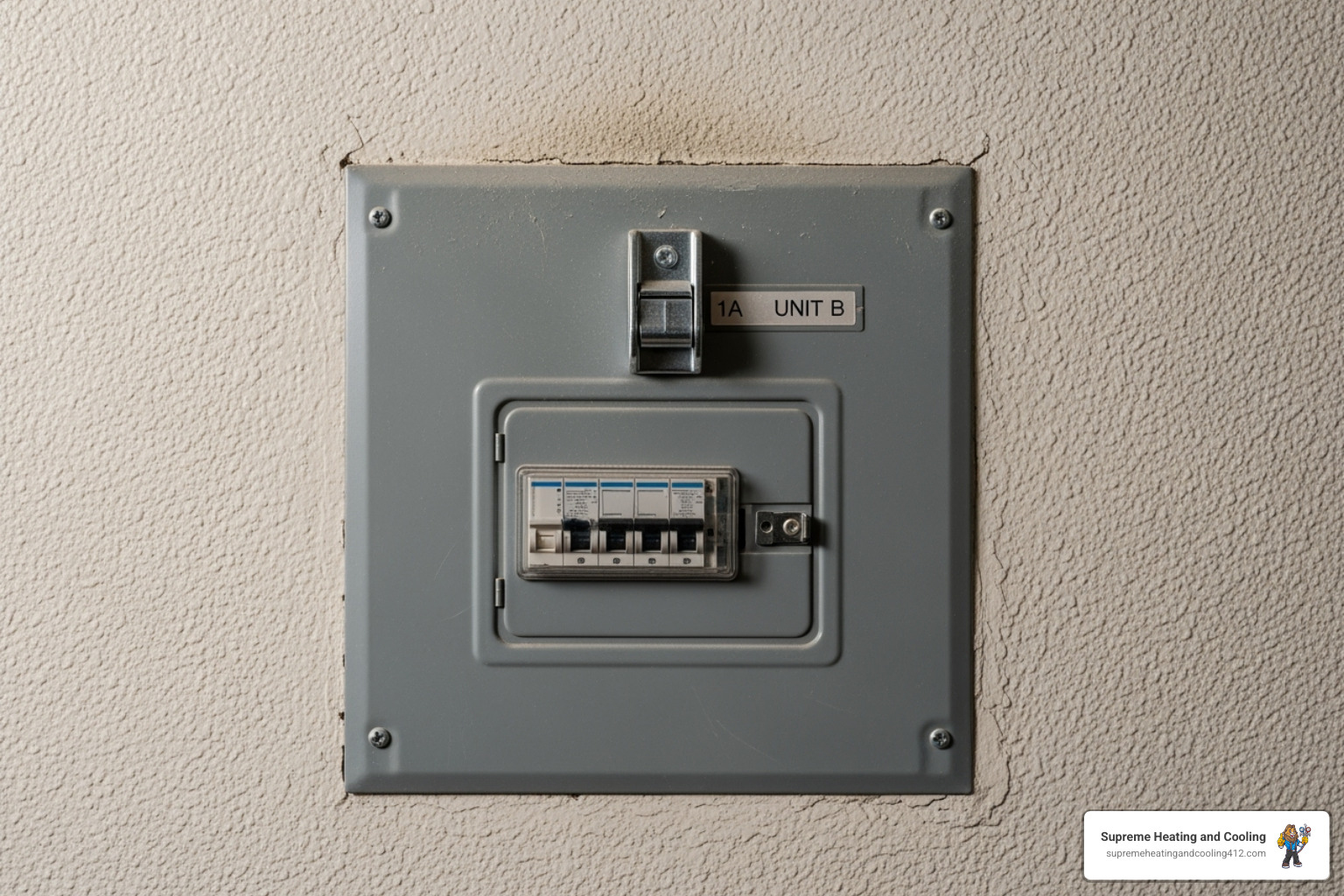When it comes to the electrical safety and functionality of your home, the fuse box—or electrical panel—is the central hub that manages the distribution of power to all your circuits. At Supreme Heating and Cooling, we understand that electrical fuse box issues can cause frequent power outages, safety hazards, and inconvenience in your daily life. Our specialized service, Electrical Fuse Box Repair Made Easy, is designed to address the common problems that arise in the fuse box, ensure safe repairs, and protect your home’s electrical system from further damage.

Understanding Common Electrical Panel and Fuse Box Issues
Electrical panels and fuse boxes, especially in older homes or in areas with frequent power fluctuations, can develop a range of problems. Recognizing these issues early can prevent costly repairs and potential dangers.
Some of the most frequent fuse box problems include:
- Blown Fuses or Tripped Breakers: These happen when a circuit is overloaded or there is a short circuit. Repeated blowing or tripping indicates a deeper issue.
- Corrosion or Rust: Moisture intrusion or age can cause corrosion on fuse connections and bus bars, leading to unreliable electrical performance.
- Overheating and Burn Marks: High resistance or loose connections in the fuse box can generate heat and cause burn marks, a clear sign of electrical distress.
- Buzzing or Crackling Sounds: This often indicates arcing or faulty connections inside the fuse box, which poses serious fire risk.
- Outdated Fuse Boxes: Many older boxes are not designed to handle the electrical load of modern homes, increasing safety risks and power issues.
- Visible Damage or Warping: Physical damage from heat, pests, or impacts can compromise fuse box integrity.
Why Timely Electrical Fuse Box Repair Is Critical for Safety
Electrical fuse boxes serve as your home’s first line of defense against electrical faults. Ignoring fuse box issues can expose your household to risks such as:
- Electrical Fires: Faulty fuse boxes generate heat and arcing, known fire hazards identified in many household fire investigations.
- Electrical Shock or Electrocution: Damaged panels can energize metal parts accessible to users.
- Frequent Power Interruptions: Disrupted circuits affect appliances and essential systems, reducing home comfort and safety.
- Increased Energy Costs: Faulty panels or breakers can cause inefficient electrical flow, wasting power.
Signs That Indicate You Need Electrical Fuse Box Repair or Replacement
Knowing when to schedule inspection or repair is vital. Look out for these indicators in your home:
- Your fuses blow or breakers trip frequently
- You notice flickering lights or dimming when appliances run
- The fuse box feels warm, hot, or you see scorch marks
- You hear buzzing, crackling, or popping from the electrical panel
- Circuit breakers are outdated or incompatible with your household’s energy needs
- You recently upgraded major appliances requiring higher electrical capacity
- Age of the fuse box exceeds 25-30 years
The Electrical Fuse Box Repair and Upgrade Process
At Supreme Heating and Cooling, our structured approach ensures your electrical panel is fully diagnosed, safely repaired, or upgraded by licensed electricians:
1. Comprehensive Inspection and Diagnosis
We begin by visually inspecting your fuse box for any signs of damage or corrosion. Using specialized instruments, we test circuit integrity, continuity, and load capacity. This step helps us identify worn components, unsafe wiring, or failing fuses and breakers.
2. Safety Assessment and Recommendations
Our electricians evaluate your home’s overall electrical load and the adequacy of your current fuse box setup. Based on this assessment, we recommend either repair or full replacement for optimal safety and performance.
3. Professional Repair or Replacement
- Repairs: When possible, we replace blown fuses, retrofit new breakers, tighten connections, and clean corrosion. This restores function without unnecessary cost.
- Upgrades: For outdated or undersized fuse boxes, we install modern circuit breakers and panels, matching your home’s power demand and current electrical codes.
All work is carried out adhering strictly to local safety regulations and electrical standards, ensuring peace of mind.
4. Post-Repair Testing and Verification
After repairs or installation, we re-test all circuits to confirm that the panel functions correctly under load, and that no hazards remain. Our thorough quality check minimizes future electrical failures.
Why Hiring Licensed Electricians for Fuse Box Work Matters
Electrical fuse box repair involves high risk due to live circuits and potential exposure to dangerous voltage. DIY attempts or unqualified personnel can lead to improper the repairs, endangering you and your property. Licensed electricians bring critical benefits:
- Expert Knowledge: Certified understanding of electrical systems, compliance codes, and safe procedures.
- Proper Tools and Equipment: Access to industry-standard diagnostic and repair tools.
- Insurance and Liability Coverage: Protection for you against accidents or damage during work.
- Warranty and Reliability: Professional work backed by warranties on parts and labor.
For residents in climates like ours where electrical loads can fluctuate from high heat air conditioning demands to cold weather heating, ensuring your electrical panel can safely handle seasonal variations is key to reliable home comfort.
Benefits of Timely Electrical Fuse Box Repair and Maintenance
Addressing fuse box issues promptly provides numerous advantages, including:
- Enhanced Home Electrical Safety: Reducing risk of shocks and fires.
- Reliable Power Supply: Minimizing outages, flickering, and interruptions.
- Energy Efficiency: Preventing wasted energy from faulty components.
- Increased Home Value: Modern, safe electrical panels appeal to future buyers.
- Compliance with Electrical Codes: Avoiding penalties and ensuring insurance coverage.
Maintaining Your Electrical Fuse Box for Long-Term Performance
Preventive maintenance extends the lifespan of your fuse box and electrical system. Here are best practices to keep in mind:
- Schedule routine electrical inspections every 2 to 3 years.
- Avoid overloading circuits; spread out heavy appliance use.
- Replace worn or cracked fuses immediately.
- Keep the fuse box dry and clean from dust and debris.
- Upgrade panels that no longer support your power needs.
By partnering with experienced professionals like Supreme Heating and Cooling, you ensure your fuse box is monitored and maintained with expert care and precision.
Electrical Fuse Box Repair Made Easy ensures your home's electrical system operates safely and efficiently, tailored to the specific needs of modern households. Don’t compromise on electrical safety, reliability, or convenience—invest in timely repairs and expert care from licensed electricians who understand the demands of your environment and electrical requirements.

.svg)

.webp)


.svg)
.webp)
.svg)
